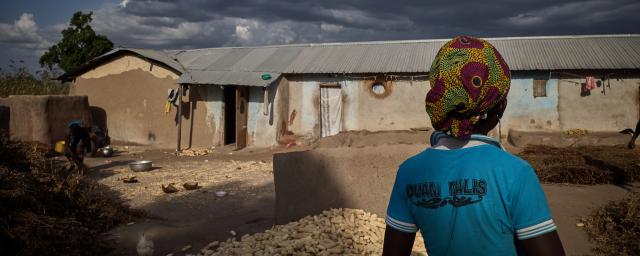
A woman walks past corn being dried on their compound whilst the rains threaten to fall. From March 2019 to March 2020, we have documented the lives of two communities, Kpatia and Tambalug, in the Garu District of Ghana’s Upper East region of Ghana, to see how climate change impacted the lives of farmers (please note these picture is not related to safeguarding). Photo: Nana Kofi Acquah/Oxfam
Lydia Doe, People and Culture Manager, has been a Safeguarding Focal Point and responsible for implementation of Safeguarding strategy and policies for Oxfam in Ghana since she joined the HR Department in 2017. As she says: “Zero tolerance is my middle name.”
Strengthening internal mechanisms
Oxfam’s approach in Ghana was to develop a three-fold approach safeguarding strategy: strengthen internal mechanisms, engage strongly with partners and, with these partners, raise community awareness about Protection against Sexual Exploitation and Abuse (PSEA). 2018 was dedicated to training staff, building awareness about Oxfam’s reporting mechanisms, and establishing and training a safeguarding focal point team to ensure a presence in every Oxfam Office in Ghana. Recently two more Oxfam focal points have been added.
Engaging and training partners
In 2019, as part of research into safeguarding policies and practices conducted in Ghana, Myanmar and Iraq, two Oxfam Global Safeguarding Advisors worked with local Oxfam in Ghana team members and partner organizations to build strategies for mitigating the risk of safeguarding in Ghana. In response to the research, partners were supported in developing their own safeguarding policies and reporting mechanisms for their organizations, including increasing community education and awareness creation.
Lydia was pleasantly surprised by the commitment of partners to “champion” the safeguarding policies within their organizations. 80% (26 organizations) of the partners Oxfam works with in Ghana have endorsed and implemented their own policies, including specific child protection policies, and has a trained focal point. Lydia noted that an important contributor to partner interest in implementing safeguarding policies is that donors are increasingly asking for such policies to be in place before granting funding.
2020: community outreach and education
Two regions in Ghana with different programmatic goals were part of the evaluation research in 2019. Sawla, in the Savannah Region, where Oxfam established a school in 2008 aiming to increase school enrollment for girls and Tarkwa, in the gold mining region of Ghana.
The Girls Model School is now one of 62 in the country. In November 2020, the Oxfam focal points, with CALID, a partner organization which promotes education and empowers girls in relation to sexual and reproductive health and rights, visited schools in Sawla and Kpandai to share key findings of the 2019 report and to discuss preventing of sexual exploitation and abuse (including reporting mechanisms that will work in communities) with a forum including young girls, representatives from traditional leaders, the Ghana Police Service and the Ghana Education Service.
Participants responded positively, with one student saying: “I think that I can now report abuse to my mum and my headmistress.”
“We got to know the referral pathways and reporting mechanism available to us.”
The Oxfam focal points ran a safeguarding education/awareness forum in Tamale with partner organization NORSAAC, a community support organization for those adversely affected by gold mining. NORSAAC informs communities about their legal rights, helping them advocate for themselves and to access support in filing claims against wrongdoing by mining companies.
The forum engaged a cross section of local youth, including members of the Northern Youth Network, Northern Region League, Young Female Parliament, Young Urban Women’s movement, Active Youth Group and Sagnarigu Youth Parliament.
“I learned the difference between safeguarding, safe programming and protection and how they are linked to each other and referral paths available to us when we face these issues.” Forum attendee Issa Rahama of League, Northern Region. In 2021 Lydia and the other focal points plan to conclude the community trainings.
Lydia is positive about the future of safeguarding in Ghana, saying: “Over my lifetime I have noticed that there are just few things that really bother people in their workplace: if the income already is a struggle, you don’t want to add a negative culture of bullying and harassment. In fact, a healthy and safe workplace is more important and will make people stay in the long run. People prefer dignity over money.”
The Safeguarding team includes:
- Johnson Naapi – Education Policy Officer
- Samuel Boateng – MEAL officer
- Keita Rose-Tahiru – Gender Advisor
- Catia Santos – Regional MEAL Advisor
- Dominique Ngoma Nkenzo – Regional Project Assistant.